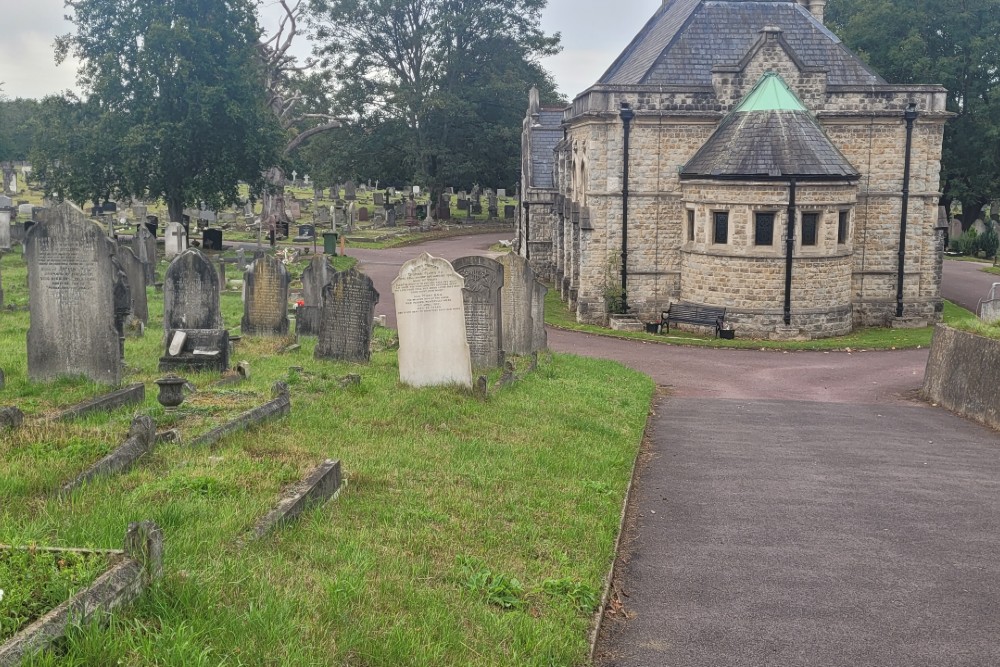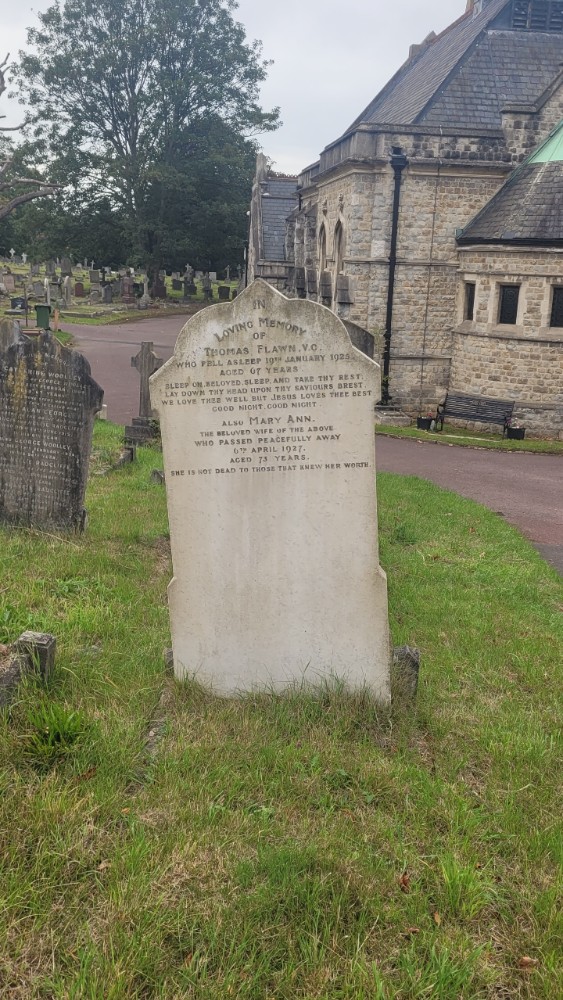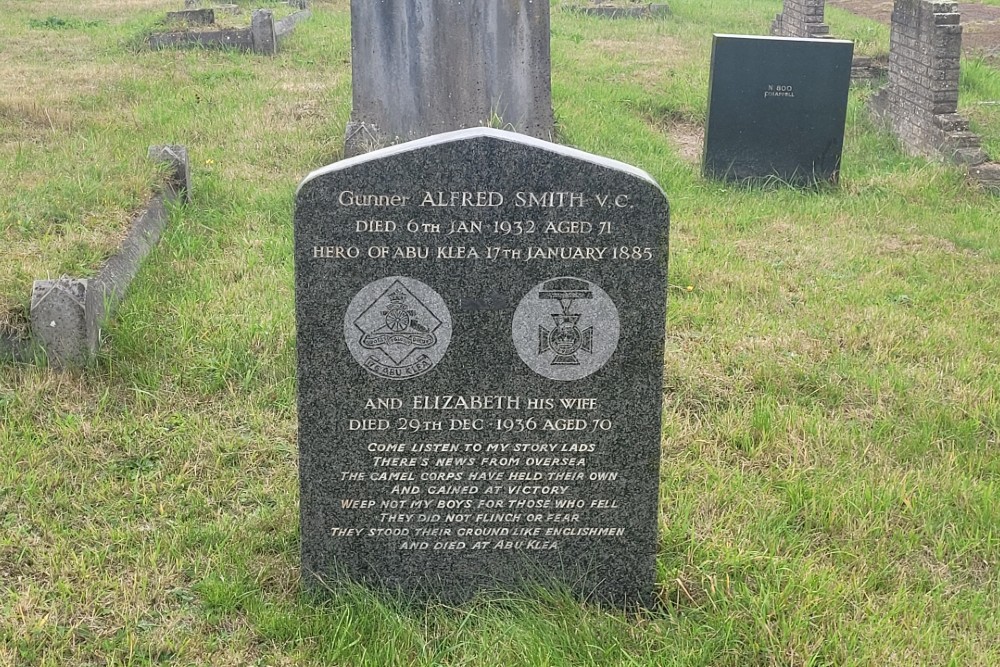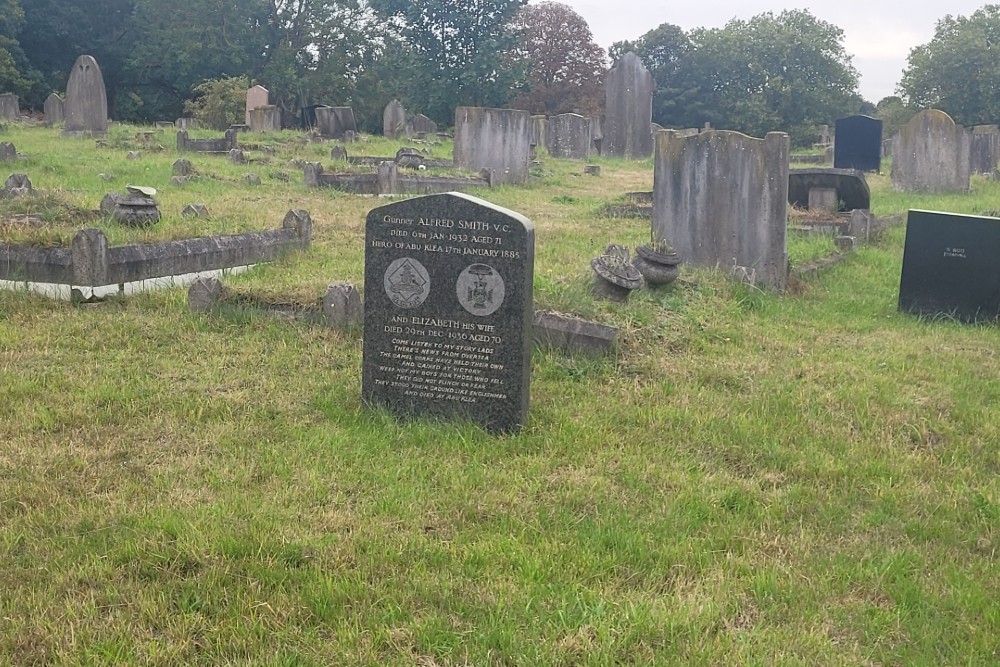Graves Victoria Cross Recipients Plumstead
In Plumstead Cemetery there are two Victoria Cross awardees buried.
Thomas Flawn VC
b. 22/12/1857 Irthlingborough, Northamptonshire. d. 19/01/1925 Plumstead, London.
Thomas Flawn (1857-1925) was born on 22nd December 1857 in Finedon, near Irthlingborough, Northamptonshire. He was the son a farm hand also called Thomas, and his wife Fanny. He was educated at the local Church school in Finedon, and enlisted on the 27th October 1876, in Leeds, into the 25th Regiment of Foot (later King’s Own Scottish Borderers). He then spent the next few years transferring between regiments. In 1877, when it looked like that there would be conflict with Russia, he transferred to the 108th Regiment of Foot, but as nothing duly happened, he quickly volunteered into the 26th Cameronians Regiment in order to be posted to South Africa for the Zulu War.
Unfortunately, Thomas didn’t make it to South Africa, as General Steel, who was commanding the 26th at Aldershot, thought that too many young officers were going, and stopped the 26th. Flawn was determined to go and fight, so volunteered for the 94th Regiment of Foot (later Connaught Rangers) and managed to go to South Africa for the latter stages of the Zulu War. Then, under the command of Sir Garnet Wolseley, he remained there to take part in the Sekukuni Campaign, where he would be awarded the Victoria Cross.
On 28th November 1879, during the attack on Sekukuni’s Town, South Africa, Lieutenant Dewar of the 1st Dragoon Guards was hit and badly wounded. When Dewar was hit, he had only Privates Thomas Flawn and Francis Fitzpatrick, and six men of the Native Contingent with him. He was incapable due to his wounds of moving without assistance so the natives tried to carry him down the hill. Suddenly, around 30 of the enemy appeared in pursuit, which caused the men of the Native Contingent to desert and run off. Dewar was therefore abandoned and would have undoubtedly been killed if it had not been for the actions of Flawn and Fitzpatrick, who alternated in carrying Dewar, one covering the retreat and firing on the enemy.
Flawn was gazetted for the VC on 23rd February 1880, and was presented with his medal alongside Fitzpatrick on 17th September 1880 in the Transvaal by Lieutenant-Colonel P R Anstruther-Lydenburg. He remained in South Africa for the First Boer War of 1881, before returning to England in 1882. He decided to leave the Army, and married the daughter of William Barley though sadly she died young, and he remarried to the daughter of Richard Oakley, who hailed from Eversholt, Northamptonshire. Flawn lived to the age of 67, dying on 19th January 1925, in Plumstead, London. He was buried in Plumstead Cemetery. Flawn’s medals came up for sale at Sotheby’s in London in November 1999, and were sold for a hammer price of £70,000. The buyer’s identity is unknown.
Medal not publicly held.
Citation
In recognition of their gallant conduct during the attack on Sekukuni’s Town, on the 28th November last, in carrying out of action Lieutenant Dewar, 1st Dragoon Guards, when badly wounded. At the time when he received his wound Lieutenant Dewar had with him only Privates Flawn and Fitzpatrick, and six of the Native Contingent, and, being incapable of moving without assistance, the natives proceeded to carry him down the hill, when about thirty of the enemy appeared in pursuit about 40 yards in the rear, whereupon the men of the Native Contingent deserted Lieutenant Dewar, who must have been killed but for the devoted gallantry of Privates Flawn and Fitzpatrick, who carried him alternately, one covering the retreat and firing on the enemy.
The London Gazette of 24 February 1880, Numb. 24814, p. 832
Alfred Smith VC
b. 13/03/1860 Barking, London. d. 06/01/1932 Plumstead, London.
Alfred Smith (1860-1932) was born on 13 March 1860 in Barking, East London. Little is known of his early life before he enlisted with the Royal Regiment of Artillery and became a Gunner. He became involved with his Regiment in the Sudan Campaign and would be awarded the Victoria Cross for his actions during the Battle of Abu Klea.
On 17th January 1885, Gunner Smith went to the rescue of a Lieutenant would was being attacked by a native. The officer was superintending his gun at the time and was unarmed. Gunner Smith approached and using the hand spike of the gun warded off the enemy’s thrust of a spear, allowed the officer to draw his sword and bring the assailant to his knees. The assailant made a wild swipe at the officer with a knife, which again Smith blocked, but not before the Lieutenant was wounded. Smith then managed to kill the native before he tried again.
Smith was gazetted for the Victoria Cross on 12th May 1885 under the erroneous name of Albert, and was presented with the medal on 3rd August 1885 by the GOC Egypt, General Sir F C A Stephenson.
Little is known about his life following service in the Artillery, and he lived to the age of 71, dying on 6th January 1932 at his home in Harger Road, Plumstead, London. He was buried in Plumstead Cemetery. The headstone was replaced in 1986, having been donated by the CWS Memorial Service. His medals are held by the Royal Artillery, though not on display due to the closure of the Royal Artillery Museum in Woolwich.
Citation
At the action of Abu Klea, on the 17th January last, when the enemy charged, the square fell back a short distance, leaving Lieutenant Guthrie, Royal Artillery, with his gun, in a comparatively unprotected position. At this moment a native rushed at Lieutenant Guthrie with a spear and would in all probability have killed that officer, who had no weapon in his hand at the time (being engaged in superintending the working of his gun), when Gunner Smith with a gun handspike warded off the thrust, thus giving Lieutenant Guthrie time to draw his sword, and with a blow bring the assailant to his knees, but as the latter fell he made a wild thrust at the Officer with a long knife, which Gunner Smith again warded off, not however before the native had managed to inflict a wound in Lieutenant Guthrie’s thigh. Before the Soudani could repeat the thrust Gunner Smith killed him with the handspike and thus for the time saved the life of his Officer, though the latter unfortunately died some days afterwards of his wound.
The London Gazette of 12 May 1885, Numb. 25469, p. 2156
Do you have more information about this location? Inform us!
Source
- Text: Victoria Cross and George Cross Organisation/Sharky Ward
- Photos: Anthony (Sharky) Ward
- https://victoriacrossonline.co.uk/alfred-smith-vc
- https://vcgca.org/our-people/profile/1265/Alfred-SMITH
- https://victoriacrossonline.co.uk/thomas-flawn-vc/
- https://vcgca.org/our-people/profile/1246/Thomas-FLAWN
Nearby
Museum
Point of interest
- Bostall Heath Camp & HAA Battery Plumstead - Plumstead
- Rifle Shell Factory Gateway, Woolwich Arsenal - Woolwich
- Information Board Next of Kin Memorial Plaques - Woolwich
Monument
- Memorial Civilian Casualties Woolwich - Plumstead
- War Memorial St. Michael and All Angels Church - Abbey Wood
- War Memorial Belvedere - Belvedere
Cemetery
- British War Graves Plumstead - Plumstead
- British War Grave Plumstead Cemetery - Plumstead
- Commonwealth War Graves Plumstead Cemetery - Plumstead







